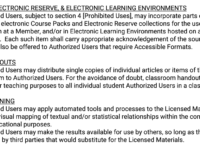Canadian copyright lobby groups have spent years falsely claiming that educational institutions refuse to pay for licences to compensate for the use of educational materials. This second post in my Fair Dealing Week series on Canadian copyright, fair dealing, and education focuses on this claim, which is a gross misrepresentation of the data (first post on Setting the Record Straight). The truth is that Canadian universities spend millions of dollars on licensing copyright materials. In fact, over the past decade, the emergence of site licenses that provide access to millions of works – books, journal articles, newspapers, and more – has led to huge increases in expenditures for access. Unlike copyright licences from copyright collectives such as Access Copyright, these digital licences provide both original access to works and the ability to use them in course materials. In the 1990s, a university would both purchase a book and pay for the right to copy a portion of it to distribute to students as course materials. Today, the university can use a single licence to gain access to the book and make it available as course material, handouts and for many other purposes since most digital licences facilitate access and permit multiple uses.
Post Tagged with: "crkn"

Law Bytes
Episode 238: David Fraser on Why Bill C-2's Lawful Access Powers May Put Canadians' Digital Security At Risk
byMichael Geist

June 30, 2025
Michael Geist
June 23, 2025
Michael Geist
Search Results placeholder
Recent Posts
 Canadian Government Caves on Digital Services Tax After Years of Dismissing the Risks of Trade Retaliation
Canadian Government Caves on Digital Services Tax After Years of Dismissing the Risks of Trade Retaliation  The Law Bytes Podcast, Episode 238: David Fraser on Why Bill C-2’s Lawful Access Powers May Put Canadians’ Digital Security At Risk
The Law Bytes Podcast, Episode 238: David Fraser on Why Bill C-2’s Lawful Access Powers May Put Canadians’ Digital Security At Risk  Ignoring the Warning Signs: Why Did the Canadian Government Dismiss the Trade Risks of a Digital Services Tax?
Ignoring the Warning Signs: Why Did the Canadian Government Dismiss the Trade Risks of a Digital Services Tax?  Why Bill C-2 Faces a Likely Constitutional Challenge By Placing Solicitor-Client Privilege at Risk
Why Bill C-2 Faces a Likely Constitutional Challenge By Placing Solicitor-Client Privilege at Risk  The Law Bytes Podcast, Episode 237: A Conversation with Jason Woywada of BCFIPA on Political Party Privacy and Bill C-4
The Law Bytes Podcast, Episode 237: A Conversation with Jason Woywada of BCFIPA on Political Party Privacy and Bill C-4
Lawful Access (Bill C-2)
Michael Geist on Substack
Get Postings via Email
Open Books
Archives
| S | M | T | W | T | F | S |
|---|---|---|---|---|---|---|
| 1 | 2 | 3 | 4 | 5 | ||
| 6 | 7 | 8 | 9 | 10 | 11 | 12 |
| 13 | 14 | 15 | 16 | 17 | 18 | 19 |
| 20 | 21 | 22 | 23 | 24 | 25 | 26 |
| 27 | 28 | 29 | 30 | 31 | ||

